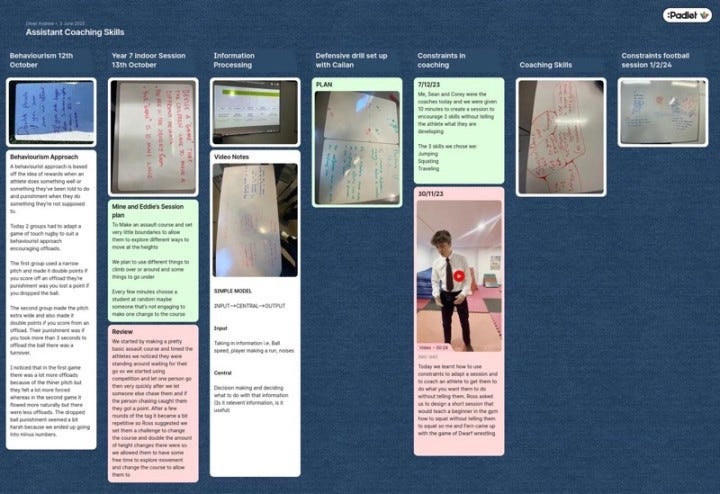Reinventing assessment in coach education
Dan Lycett is Head of PE and Sports at St David’s College. In a recent LinkedIn post, he wrote about a different approach to coach assessment. So I wanted to dig deeper and asked Dan to write more.
In our Level 3 Coach Development Programme, we’ve reimagined how students capture, reflect, and progress, without getting bogged down in admin or artificial tasks.
We started by using ‘traditional’ methods. Traditional coursework often rewards neat folders and tidy write-ups. However coaching is messy, reactive and live.
We then wanted to get as much that ‘in the moment’ learning. We use voice notes, hooked up phones to chest cams and photos uploaded to share point. We use Padlet now, which is a living portfolio. They can capture everything in one place, including videos, voice notes, photos of whiteboards, annotations.
If a student has a hot take after a session, they can record it straight into Padlet.
If they saw a coaching moment worth capturing, they can video it and then reflect later.
The process isn’t about ‘filling in work’. It’s about building a real coaching identity. The art is guiding the students’ attention to what, where and when. We made stamps this year to try and get the ball rolling. Students must observe 11 and coach at least 6 sessions. They collect unique stamps for each one, which creates a tangible, motivating record.
We have circle time to discuss what they see. This allows us to tease out some misconceptions. We discuss what they have seen and how it has impacted the students.
When they coach each other, to get ideas and drive concepts, they give feedback. Some of the pupils come to multiple sessions a week. Over the two years that will be hundreds of hours of coaching contact time, whilst being mentored 1-1 with a support class.
We set session tasks for them to coach the group and again reflect again on practice design. Usually they use block practice and drill.
We aim to focus on reflection and craft. By streamlining how evidence is captured, we free students to think like coaches. They adapt, converse, try, fail, and learn. They become reflective, flexible, and ready for the real world, not just assessment.
This is what a lived-in, authentic education looks like. After over 20 years of teaching, I want students to leave with more than paper. I believe it creates engaged learners who feel the value in what they do, and who are more than ready for what comes next.
I believe that within coach development that sense-making and support need to be closer. The gap between school years and the world also needs to be bridged.
Learning doesn’t always have to happen through decontextualised certificates. Planning, adapting in the moment, reflect, collaboration and supporting others can be experienced in a messier and more authentic way.





